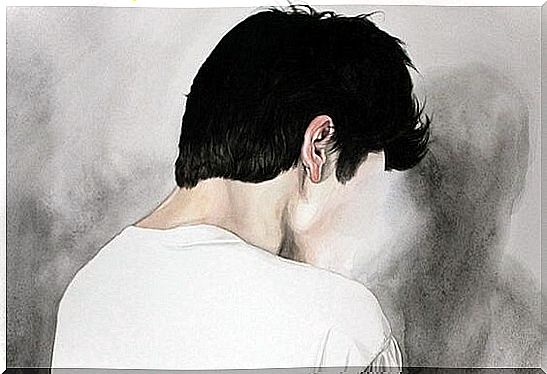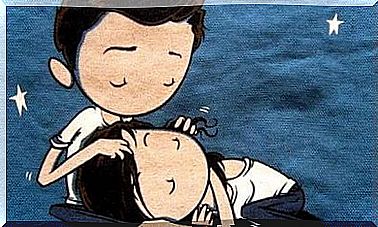Fear Of Losing Control: When Anxiety Thinks For Me

When anxiety thinks for us, everything starts to blur. The fear of losing control grips us because it is our most adverse emotions that take the helm of command, while intrusive thoughts draw for us a threatening scenario from which to defend ourselves. These are moments where we fear doing harm to someone, limit moments that we must know how to manage.
No one will be surprised to learn that this is one of the most common fears that humans often experience. For example, it is suffered by those who live in a situation of continuous wear and tear in their work environment and fear that from one moment to the next, all that contained and long silenced tension will end up exploding in the worst way.
It is also suffered by the father or mother of the family who carries multiple responsibilities, infinite problems and the anguishing knot of their concerns on their shoulders. They are situations where you live with the fear of losing control at any time and reacting with a bad word or a bad gesture to the people you love the most.
No one is oblivious to these kinds of realities. Thus, and although it is normal that in our day to day the factor “fear” is present in some other small aspect, it is not permissible for us to give it all the power. It’s like living with another “me” inside of us, a Mr. Hyde who at the slightest bit can bring to the surface the worst version of ourselves.

When you give your anxiety all control
Roberto has had a time of ups and downs and a lot of anxiety. After almost a year in unemployment, he feels gripped in any area of his life. His parents, for their part, concerned about his situation, try to cheer him up and suggest that he go to eat at home every day. However, at the last meal Roberto was aware that he began to fear losing control from one moment to the next.
During lunch last weekend, his brother made a small comment about his situation that he interpreted in the worst possible way. His emotional response was excessive, he reacted with anger, raised his voice and said a series of words that he now regrets. The meal ended with his mother’s tears and a slam from his brother. Our protagonist knows that he has a problem, but he lacks resources to manage it properly …
It is possible that this situation is known to us, therefore, something that we should understand in the first place is the way in which anxiety itself alters our behavior, our thoughts and our response style towards certain stimuli. Let’s see it next.

The demon of anxiety and its mechanism of action
When people drag an excess of worries, fears and uncertainties, our brain performs a somewhat spartan interpretation: be careful, everything that surrounds you is threatening. After that conclusion, determine that there is only one way out, defend ourselves from everything and everyone.
- Our judgment ceases to be rational and we cede the helm of command to that more instinctive, less reflective and of course not logical autopilot.
- We experience a very uncomfortable feeling of unreality, as if everything that happens is not authentic and as if, in turn, everything is alien to us (depersonalization).
- We fall into a state of continuous hypervigilance , we are always on the defensive, overreacting to the smallest things, generating obsessive, negative thoughts and anticipating things that have not yet happened.
How to manage the fear of losing control
One piece of information we see very often in multiple self-help books is the idea that “In any situation, we all have the opportunity to react in one way or another. Choosing the best path is our responsibility ”. Well, it must be said that as a message it can be very inspiring, but when a person suffers from anxiety it is very difficult for them to discern which is the right path.
An anxious mind does not think, it reacts. An anxious mind does not have full control over itself and therefore will not always make the best choices. All this forces us to understand that managing these situations is not an easy task, only good intentions are not enough when what is inside us is a knot that prevents us from breathing and thinking clearly.
Let’s reflect on which strategies are usually the best to resolve the fear of losing control.

Steps to prevent our anxiety from taking control
- First step: don’t control. Let’s think about it for a moment: we spend a lot of our time controlling our frustration, hiding thoughts, swallowing emotions, hiding moods… Let’s get rid of so much contention and do something cathartic and liberating to begin with. Let’s be able to put on the table what is inside us, let’s express out loud how we feel, without fear.
- Let’s talk about our fears, let’s reason with them. One way to deactivate the power of fear is by giving it a name and talking to it -> “I am afraid of losing my family because I am aware that lately I am losing control of my emotions, I say things that I later regret.”
- Control your thoughts to control your emotions. This objective is the premise of cognitive-behavioral therapy, one of the most suitable for these cases characterized by the fear of losing control over ourselves.
The last step requires freeing our body to free our mind. This end can be achieved through multiple therapies such as Jacobson’s progressive muscle relaxation, mindfulness, yoga or any physical exercise. With this type of strategy we will release physical tensions and our brain will gradually acquire a more relaxed approach.
Regaining control over ourselves is possible, let’s work on it.










